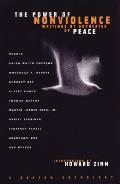 The eleventh chapter of The Power of Nonviolence: Writings by Advocates of Peace contains Albert Camus‘ 1946 essay Neither Victims nor Executioners. This week we discuss the seventh part of the essay, A New Social Contract. Camus wrote this 16-page essay as World War II had just ended, and it seemed as if the Soviet Union and the United States were dragging the planet into the horrors of a third world war. Eleven years later, he would win the Nobel Prize for Literature.
The eleventh chapter of The Power of Nonviolence: Writings by Advocates of Peace contains Albert Camus‘ 1946 essay Neither Victims nor Executioners. This week we discuss the seventh part of the essay, A New Social Contract. Camus wrote this 16-page essay as World War II had just ended, and it seemed as if the Soviet Union and the United States were dragging the planet into the horrors of a third world war. Eleven years later, he would win the Nobel Prize for Literature.
The social contract that Camus is referring to was most famously discussed by Hobbes, Locke, and Rousseau. The social contract is thought to be the terms on which the people consent to be governed. This discussion profoundly influenced the US Declaration of Independence. Continue reading Camus’ Neither Victims nor Executioners: A New Social Contract


